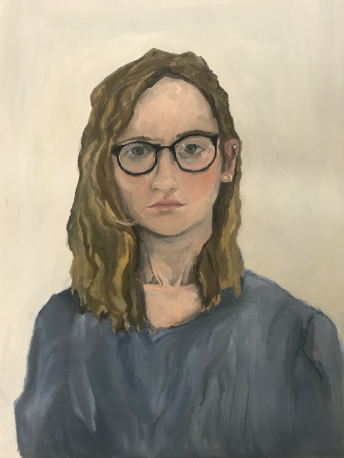Free shipping orders over $50
Scholarship Finalists 2018
1. Joanne Deverson: Nurse Audrey
Last year, my loving uncle was diagnosis with Congestive heart failure (CHF) and poor circulation of the hands and legs. He was taken to the hospital because he was having shortness of breath and low blood pressure. He feared that the providers at the hospital were going to amputate his legs and one hand as told by his Cardiologist before being admitted. My uncle had different nurses who cared for him, but there was one nurse that stood out and eased his fears.
Nurse Audrey is a Registered Nurse who took her job seriously. She not only came to do her rounds, but she took care of my uncle as if she were caring for a family member.
During this time, my uncle voiced to me how he did not want to continue living. I took a step back trying to hold back the tears and not have my voice crack, I said to him, “You are going to dance with me at my wedding and tell jokes.”
He said, “I’ll be there and see you from heaven.”
It was so hard to redirect the conversation and not just completely break down and cry. He was in a very depressive state of mind because of his fears of amputation, he no longer desired to eat, and he felt a loss of freedom to go to the bathroom on his own.
Nurse Audrey noticed that he was not eating the foods on his tray. She reassured him that everything was going to be fine and explained that not eating or drinking was affecting his organs and him getting better. She asked him, “What kinds of foods do you like to eat?” I chuckled because my uncle likes sweets. She brought my uncle some “sweet” foods, ice cream, cookies, and crackers. Although my uncle was on a puree diet, she carefully watched him chew and swallow, and once he was able to swallow, she would add more cookies and crackers to the table. She advocated for my uncle with the providers for his diet to be changed to soft foods rather than puree and the request was granted.
A little later on, my uncle said he wanted to use the bathroom and I said, “I’ll go and get the nurse.”
I went to the nurse’s station and said to Nurse Audrey, “My uncle wants to go to the bathroom and he is concerned about amputation.”
She said, “He can’t go to the bathroom, he is at risk for falls.”
I asked her, “Why can’t my uncle go to the bathroom using his cane or with someone’s assistance?”
She said, “The provider’s orders indicate that he can’t get up out of bed because of his risk for falls.”
I said, “At home he uses his cane and walks to the bathroom, which is much further away than the one in his room.”
She said, “Even though he has walked with a cane at home, the hospital environment is different and your uncle’s INR levels are still high which adds to the risk of a bleed. What this means is if he were to fall, it would take your uncle longer for his blood to clot. I’ll have the CNA come and assist him with a bed pan or a urinal.”
She noticed I was not happy. I went back to tell my uncle that he could not take four steps to the bathroom; it did not make sense. He was not happy when I gave him the news. Nurse Audrey came into the room and explained to my uncle that because of the medication, his blood was very thin and he needed time for his blood levels to get lower, but in the meantime, he was at risk for falls.
Afterwards the hospital doctors came into the room, assessed my uncle’s circulation, and determined that amputation was not medically necessary. Nurse Audrey kept on reassuring my uncle that he could let go of his fears as the attending provider said, “No amputations were necessary.”
She gave him so much love, made him feel comfortable, and visited him every hour. This made a huge difference in the way my uncle was feeling to the point where he came out of his depression, gained the nurse’s trust, and his desire to eat and drink again.
I saw the love displayed by her actions and careful attention to detail to address my uncle’s concerns and fears. Before going home, she would stop by my uncle’s room make sure that he had everything he needed, had the CNA fix his bed, and before leaving she would say, “Good night Mr. Deverson. Everything is going to be all right. I will be praying for you.”
2. Emilia DeGroat: Dancing with Peter
Just do it. I squeezed my eyes shut, trying to muster up whatever courage I had inside.
I knew more self-talk wouldn’t motivate me; I was stalling.
I was going to ask a guy to dance.
Memories flowed into my head like wine. Remembering how shy I used to be, how falsely secure I was in my own clique of friends that I had no identity, no bravery, independent of them. Remembering how many moments were wasted because of my fear of the unknown, of taking risks.
Looking over at him, leaning against a wall and looking uncomfortable, wanting to be a part of everything, but wanting to crawl into the nearest closet at the same time, caused mixed feelings of sympathy and compassion to well up inside me. I knew exactly how he felt.
But I also knew how it felt when you broke free of your own chains, let go of your fear of what others think, and just did something. Something different. Something crazy. Something you’ve never done before. A first kiss, a first job, talking to a stranger, traveling alone. Those victories, big and small – you treasure them. They build you up.
But it takes someone to spur you into action.
So, I was going to do it. No matter how unconventional, no matter how awkward it might be (he might say no he might say no he might say no) I was going to ask him to dance. Maybe he never had before. Maybe he’d always been a loner, a wallflower.
The sudden clarity that I was going to do it erased all my ideas of running to the bathroom and isolating, giving myself more stupid pep talks that would never result in action.
I had finally decided to make my way over to him when I realized I was already only a few steps away.
My heart was pounding but my voice was clear: “I’m Emilia.”
Startled, he turned his head. He looked nervous; he visibly swallowed as he replied. “P-peter.”
We awkwardly shook hands.
Just say it. “Want to dance?” I asked.
His eyes widened. “Are you…serious?” His disbelief almost made me laugh.
“Duh!” Rolling my eyes, smiling, I grabbed his hand and practically dragged him to the dancefloor.
In short, that was the best dance of my life. Correction: both of our lives. His two left feet constantly tripped me up, but as I taught him, and he stumbled, and eventually improved, our mingled laughter and shared moments were worth every second of momentary pain.
That dance taught me a lot – it’ll stay in my repertoire of memories for a long, long time.
When the song ended, he led me off the floor with a big smile. He seemed taller; his newfound confidence was soaring.
Once we unlinked arms, he looked at me seriously and said, “Thank you.” He went on to say how he never talked at school; he was too nervous that he would say the wrong thing, do the wrong thing. He kept to himself, but always felt like he belonged where the action was. He just never had the guts.
“You have no idea what you’ve done for me.”
I didn’t say anything at first. Finally, I told him how I almost didn’t come over because I was suffering with the same fears. But when I did follow through, my fear dissolved into nothing and my true personality emerged. He nodded, smiling. He understood.
Nothing more was really said. A sudden urge to hug him tugged at me; I did. After holding on maybe a minute too long, I let go. We exchanged one more glance; then I turned and walked a short distance away. When I looked back, he was already striding towards another wallflower – a shy-looking girl who probably had never been asked to dance in her life.
Throughout the rest of the night, when I wasn’t being spun in every imaginable direction and changing partners faster than texts in a group chat, I would see Peter laughing and spinning all different girls himself.
Taking a breather and a cup of punch, I sat for a couple minutes towards the end of the evening. I smiled to myself, watching. Suddenly becoming a little sober, I tried to think what would’ve happened to Peter and his infatuated dance partners if I hadn’t taken the chance.
I never saw Peter again. But our dance, and his newfound self-confidence and willingness to take risks that night, inspire me every day to step out of my comfort zone. Making a new friend or letting a toxic one go. Going somewhere I’ve never gone before, being willing to do things by myself. Sharing my Faith with someone who never gave a second thought to religion. Opportunities to do these acts of kindness arise every day. It’s our choice whether we let fear dominate us, make us wonder for the rest of our lives, “What if I had done differently?” Or, if we accept the challenge, do an act of kindness, and enable someone else to continue the domino effect.
3. Hayley Goen: Stronger Than You Think
“You’re stronger than you think.” The one sentence that changed the perspective of every person in the room; the one sentence that changed the perspective of my future. My grandpa fell and hurt his hip and hit his head a couple years ago and the process of physical therapy was draining for him and for us, but the pure kindness and patience of his therapist changed all of our lives for the better.
One day began just like the others, where my dad and I went to visit my grandpa in the hospital. We attended his physical training session, like usual, but this day was different. My grandpa was the kindest man I’d ever known, forming quick friendships with all of his nurses and fellow patients. He struggled with Parkinson’s disease and dementia, though, and the training session he had in store for him that day would cause him to lose motivation and confidence in himself.
He was riding a motorized bicycle when he stopped and demanded to go back to his wheelchair. He started screaming insults and curse words at his therapist and the others in the training room, thinking that by growing louder and more impatient he would get his way. His therapist rushed to his side and immediately stopped the machine and made him look into her eyes.
“You went through a life-changing fall. You need to learn how to walk, talk, move, and do everything for yourself again. You have a family that is relying on you, and you cannot disappoint them. You’re stronger than you think.”
She leaned over and whispered more to him, and finished her speech with a simple “let’s do this together.”
I watched in awe how this tiny woman managed to change the total mindset of my stubborn grandpa without missing a beat. Without a word, he turned around and began riding his bike again and his therapist began riding the bike next to him.
She dedicated hours of her time each day to him, working late to do the same for him and all of her other patients. She had a home life, but she cared so deeply about her job that she handled it all without hesitation. For the entirety of his physical therapy from that moment on, I didn’t hear one complaint come from his mouth.
I found myself thinking about her comment and how selfless she was for days and weeks after she said it. “You’re stronger than you think.” It wasn’t even the comment itself; it was who she was and how easily she gave up her free time to help anyone that needed it. It motivated me to be a better, more selfless person. Honestly, it motivated me to become an occupational therapist. She had a smile on her face every moment of every day, even when the bags under her eyes were signs of her exhaustion and her frantic walk was a sign of her stress. I realized that I had made this woman my role model; I wanted to be as selfless and kind as her, I wanted to help people the way she did. She changed my grandpa’s life, and I will always be thankful to her for that. I can only imagine how many other lives she has changed since, and her kindness and motivation throughout.
I am now studying kinesiology in college in hopes to go to graduate school for occupational therapy. I work on my kindness each and every day, trying to keep that positive mindset she kept through every day of her work. I strive to change someone’s life someday through the kindness that inspired me that one day in a therapy room.
4. Meghan Kessinger: Give Of Your Time
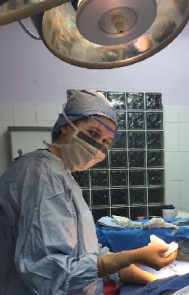
In a small rural town in Santa Barbara, Honduras there are people traveling for hours by foot, dirt bike, and bus. They are bringing with them their fathers and mothers, their sons and daughters. Their only goal is to receive the surgery they have been waiting years for. These people have been denied medical care by the country’s hospitals because they are too poor and so they continue to suffer. At Hospital Sula Socorro de lo Alto, no one is turned away and everyone is helped.
During my sophomore year of high school, I was given the opportunity to join a surgical team on their medical brigade to Honduras. As the youngest and least experienced, all I could offer was my time and eagerness to learn. The team I joined was the kindest and most dedicated group I have ever been a part of. The team brought with them hundreds of pounds of medical supplies for the hospital. Many of the items were donated by their colleagues at work and many purchased supplies on their own.
While in Santa Barbara, our team worked around the clock to treat as many patients as we could. We did many gallbladder removals, hernia repairs, and hysterectomies. The patients we treated were so grateful and appreciative. I will never forget the tears they shed when I told them in Spanish that their surgery was successful.
It was in Honduras that I discovered my passion for international medicine and it was an experience I will never forget. Even though I could not diagnose injuries or perform surgery, I was able to sit with the patients and keep them comfortable before their procedures. Just spending time with the patients helped their healing process and eased the worries of their families. In the future, I hope to become a urologist and return to Honduras to give of my time and talents to the people who need it the most.
Today I continue to give of my time in a hospital setting. For the past two summers, I have been a volunteer on a patient floor at my local hospital. Every week I spent time with the patients and assist the nurses with their care. During the school year, I go to the hospital and I bring Holy Communion to the sick. I do these things not just because I want to go into the medical field, but because I know sometimes you just need someone to sit with or talk to. It costs nothing to simply give of your time. Spending time with someone in need is one of the most rewarding experiences and it is truly the best gift to give.
5. Olivia Armstrong: Stitches and Stormy Nights
It was a stormy night; dark clouds hovered over as they released their possessions, rain, lots of rain. I peered out of my front door window, a habit I had taken to doing as we had two guard dogs. My eyes widened with horror. There on my front porch she lay sprawled across the tiles, almost lifeless. I swung the door open and dashed to her side. She whimpered as the gaping hole in her chest moved with every struggling breath she took. My heart raced, my mind raced, I had no idea what to do. No medical facility would be open in this kind of storm; my dog, my lifelong loyal friend, would have to make it through the night on her own.
“Or would she,” I thought. I ran to my father who told me we would have to wait until morning. I rushed to my room, to the corner where one of my most prized possessions sat unopened. It had been given to me by my grandfather upon him noticing how captivated I had become by it. Of course, I had never thought there would be a time I would have to use it, but just the idea of it belonging to me satisfied me. I had become immediately entranced with its contents. Enclosed was a bright blue medical drape, various needles and syringes, along with the small fragile bottles of anesthesia. My father, now seeing my determination and hands full with my suture kit, grabbed old sheets and carried her to the cellar.
It was dimly lit with a musty smell, but it would have to do. We lay her down and pulled the latex gloves over our hands.
“This is your patient now sweetie, you can do this,” said my father. His words rung in mind over and over. Of course, I had no experience with any type of patients, much less a shot canine, but a vivid collection of internet searches and medical encyclopedia entries had remained in my mind. I recalled everything I could and reached for the anesthesia. The syringe became full of this powerful liquid, which I hoped, would help keep my dog from pain.
“Steady hands,” I thought. I injected her, trying my hardest to continue when she yelped in pain. I strung the needle up. My nerves wanted to get the best of me, but I knew full well I could not afford that and neither could my patient.
“It’s just like sewing,” I thought. I followed the only pattern of sewing I knew as I slowly sutured the gunshot wound up. I tied it off and doused the area with antiseptic.
“Great work sweetie,” said my father. I stood up and sighed with relief.
The stitches done by an unqualified 16-year-old were not perfect, but they had worked. They had given me the understanding of how truly powerful those who comprehend medicine can be. These stitches gave me more than experience, they gave me a dream.
6. Elizabeth Kempski: My Grandpa’s Fall
On December 4, 2017, my grandfather fell 15 feet out of a tree stand and landed on his back. This fall caused him to be paralyzed from his belly button down. This man is 63 years old and one of the most active people I know. From this point forward I knew it would be a struggle and I would have to help in every way I could.
My grandpa spent a month and a half in a rehab center in Jacksonville, Florida. Everything was great there but once he got home there was a whole new challenge coming. His house was not handicap accessible so it was very hard for him to get around. He had to call a contractor to make the bathroom and his bedroom handicap accessible.
Since he no longer had scheduled therapy every day, my grandpa had to create his own workout room so he could stimulate his nerves and muscles. However, on Friday’s my grandpa goes to physical and occupational therapy. He gets a workout that is different from what he does at home. I have been able to go with him a few times and it is amazing to see how involved the therapists are with him and his life. They do not just tell him to do something and walk away. They stand there with him and help if he needs it. They also ask about his life and his family to make the experience more enjoyable and personal. The few times that I have been able to go with him to therapy, the therapists have gotten me involved and they have shown me some techniques on how to help him get around as well as some exercises that he can do to make himself stronger.
Before my grandpa fell, I didn’t really know what I wanted to do. I had tossed around the idea of computer engineering but I wasn’t really interested in the field. After going to therapy with him, I got to see people who were helping others regain their lives and I knew what I wanted to do. I was stuck between occupational and physical therapy, but after talking with people from both sides I made my choice. I decided that I wanted to be an occupational therapist. Many people told me that with occupational therapy, you get the opportunity to be more creative and you can think out of the box.
Since I made my decision, I have been back to therapy with my grandpa and I have worked more on the occupational side and I love it. I get to help people but I also get to learn new techniques that can help my grandpa without him having to leave his house. If my grandpa’s therapists had not been so involved and personable then I don’t think I would have found my passion for this field.
My grandpa is still working on regaining feeling and movement in his legs. However, he has regained some sensation in parts that didn’t have it before. Progress is being made and he continues to go to therapy and now, I never miss an opportunity to tag along.
7. Aaron Boykin: Kindness in Tegucigalpa
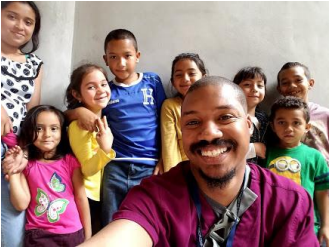
My name is Aaron Boykin and I am a current nursing student at Resurrection University in Chicago, IL. I will complete my studies in April 2019, and attain my Bachelor’s Degree in Nursing. I want to become a nurse. I have always been interested in healthcare and I am committed to holistic care. I do not care about a person’s race, beliefs, age, gender, orientation, or social class, for we are all one family, and it is important that we look after one another. I believe my gift to the world is my compassion, understanding, and commitment to improving the health and the livelihood of an individual, as well as, my family and my community. It is disheartening to witness health disparities in our communities, and I want to work toward reducing barriers and work towards establishing initiatives to make access to healthcare easier for all.
In April 2018, I had the opportunity to travel to Tegucigalpa, Honduras with 40 of my classmates to perform mission nursing with World Gospel Outreach. It was my first mission trip and my first experience outside the United States. I have to admit that I was very shocked to see the living conditions of residents in Honduras. I have read in research that over 2/3 of the country is in poverty; however, my research did not prepare me for what I saw. I was very saddened because many families lived in homes no larger than a bedroom. Many families did not have any beds to sleep on, a bathroom, or a kitchen. They had no clean drinking water. Many people had to walk for miles for work and food.
I was nervous because I thought my language barrier of not speaking Spanish would hinder my ability to give holistic care. I was very humbled to be welcomed in the church where we set up our clinic. Despite the illnesses, pain, or suffering the residents received, they all had smiles on their faces. They were very hospitable to our presence and appreciated everything we were able to do for them. We started by counting out medication to last each patient 30 days. We had a variety of vitamins, antibiotics, antifungal, and pain medications. We also had a variety of creams and ointments and glasses to give away.
During our clinic visits, we had a clinical team with several stations, a dental team with three stations, an ophthalmology/optometry station, an evangelical station for prayer, pharmacy and children’s station. Our clinical team diagnosed and treated various ailments and wrote prescriptions for our pharmacy team to fill. The vision station measured visual acuity and the ophthalmologist prescribed glasses for those who were vision-impaired. Our evangelical station provided prayers for families who needed it. Our dental teams performed various dental procedures including cleanings and extractions. Our pharmacy team fulfilled all prescriptions written by the medical teams and dentistry. Our children station screened kids aged 5 and above for lice and provided lice treatments and styled hair and nails for the girls. We had two extra teams of students available. They were a part of our construction crews. One team painted various homes that needed severe coverage. The other team laid out concrete flooring to a few homes due to the fact that most residences slept on the bare dirt and soil of the ground. This also helps reduce the number of children with lice.
Overall, I had an amazing experience in Tegucigalpa. Even though there are millions of Americans living in poverty, Honduras does not have the economy or infrastructure to create federal programs for their people. It takes donations and teams of individuals like my fellow classmates to donate their time and money to help these people. Upon returning to the U.S., I could not help but wonder how I could teach my own children to be humble and selfless. My experience in Honduras just reinforced my mission to complete my education and become a nurse.
8. Autumn Rosenthal: My Physical Therapists
I woke in a hospital room my senior year, fall 2017. I had no feelings from my neck down. I thought I was buried under something. I was burning up. I felt as if my body was on fire. I tried to talk but I didn’t understand the reason that no one could understand me. I couldn’t remember the reason I was in the hospital. I was very confused.
I later learned that I was on a ventilator in a pediatric ICU. I was paralyzed from the neck down from a rare autoimmune disorder called Guillain-Barre Syndrome (GBS). Individuals with GBS can experience paralysis when their own body's immune system attacks its nerves. The recovery process can take several months to several years.
I thought to myself just a few days prior I was perfectly healthy. I had gone to the zoo with my mom and younger brothers. I had never been sick other than having a cold or sinus infection. I was enjoying my senior year including attending football games, spending time with my friends and driving my jeep that I love so much. I was planning to attend college the following fall. I felt like I had lost everything.
I was hospitalized for about two months including at an inpatient rehabilitation unit for about one month. I had to relearn to walk, eat, write, brush my teeth and other tasks I previously took for granted. Once I was discharged from the hospital I utilized a wheel chair, then a cane for several months. One year has occurred since I was diagnosed with GBS and I continue to experience chronic fatigue, muscle weakness, dizziness and nausea. However, I was able to gain my mobility back as a result of my progress in physical therapy.
I received physical therapy from several physical therapists while in the hospital and at an outpatient clinic. I participated in physical therapy for about one year. All of my physical therapists were very kind and inspiring. I am thankful every day for them. I am hopeful that I will make a full recovery as a result from the inspiration I have received from my physical therapist. I can’t imagine what my life would be like today without the care they provided to me.
When I met my first physical therapist I had been bed bound unable to move for about two weeks. She assisted with obtaining a special neuro-wheelchair that allowed my father to take me around the hospital in. The first time I left my room he took me to a window and we looked out at the fall leaves. This was the first time I believed that a recovery from my illness was possible. Months later when I graduated from high school she attended my graduation.
My physical therapist assisting with my care at the inpatient rehabilitation was also very kind and inspiring during my care. When I first met him, I was scared to be transferred from by bed into a regular wheelchair to attend my therapy. I continued to have no feeling in most of my body. When I was transferred out of my bed into the chair I could not even feel that my feet were on the ground. I was so scared that he would drop me. I felt so powerless, relying on others for all of my care. This was the most powerless and scary experience that has occurred in my life. He was also very reassuring that I would be okay.
He also motivated me to work hard every day to accomplish the goals that I set for my recovery. He was confident that I could be discharged before Christmas. He also inspired me to return to school in time to complete by senior year and graduate from high school. After I began receiving physical therapy with him I never doubted that I would make a full recovery from my illness.
Because of the acts of kindness I received from my physical therapists, I am inspired to become a physical therapist myself. When I am a physical therapy I plan on showing my patients the same kindness they displayed during my care. I plan to inspire my patients that they can recover from an injury and/or illness. I will take a very difficult time in my life and utilize my experience to give hope to others.
At the zoo two days before my illness:
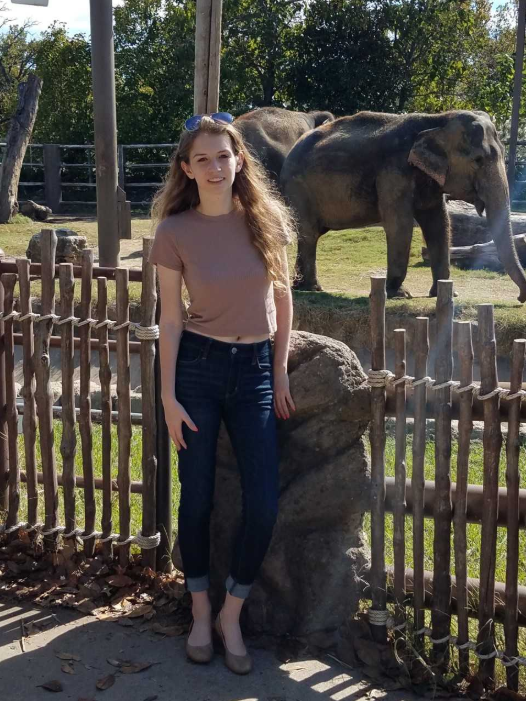
Me attending physical therapy:
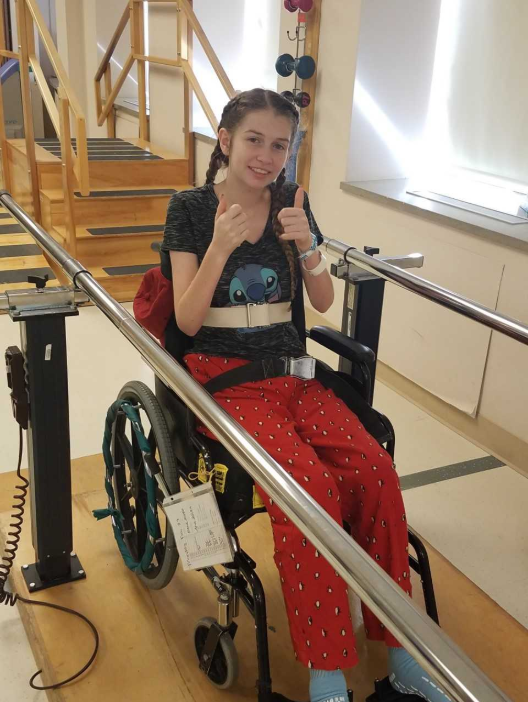
The first time I walked again after my illness:
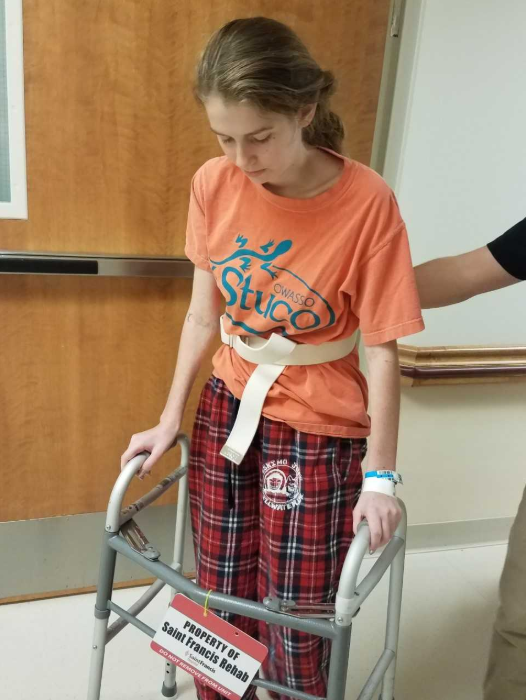
My spring senior pictures:
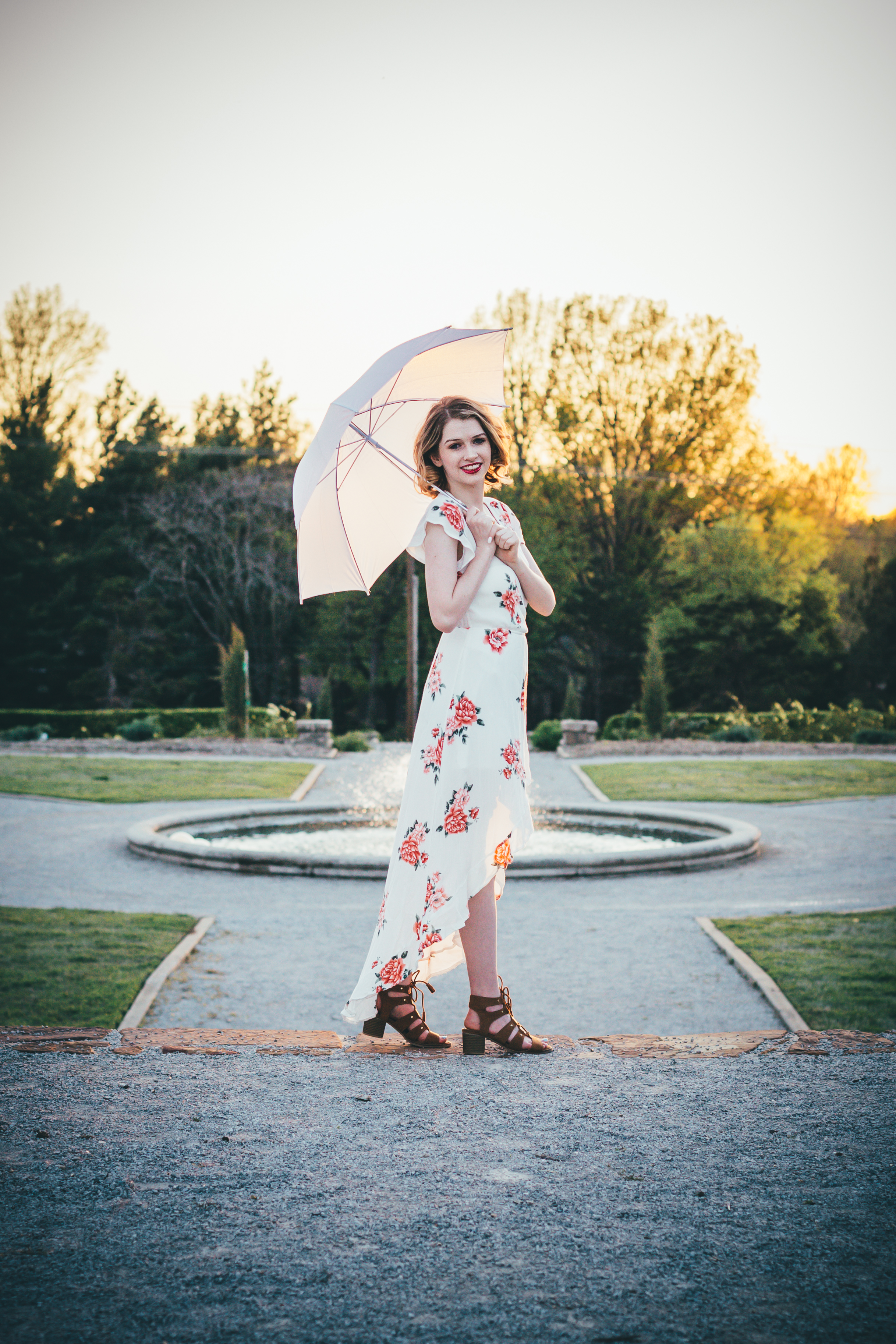
9. Savannah McMillen: Dr. R’s Act of Kindness
Throughout my college career, I have struggled tremendously in my personal life. In February of 2017, I married a US soldier. A week after we got married, he suffered from a traumatic brain injury that left him severely disabled. I struggled as I became a caregiver for him as well as a full-time student.
One of my professors, Dr. R, noticed me slowly becoming more tired and stressed as the semester went on. She always made a point to ask me how I was doing and how things at home were. I gave her a simple “fine” or “good” every time, but that did not stop her from asking every day.
The following semester, I had Dr. R again for a different class. The only difference was I was now being abused at home. My husband told me every day that my college dreams were useless. After a while, I began to believe him. Dr. R could tell something was wrong, but I still gave her the same answers as before.
One day, however, I woke up to my bank accounts drained, credit card maxed out, and my husband gone with our only car. I had no way to make it to school in time for class. As my luck goes, I had an exam in her class that day. I immediately sent Dr. R an email explaining what had been happening and begged for a chance to make up the test. She told me that whenever I could make it up to the school to come to her office hours and we could talk.
A few hours later, I was able to have a friend take me to campus. I was shaking as I walked to her office. I could not afford to take a zero on a major grade. I knew this would tank my GPA. How could this be happening to me? As soon as I walked in the door, I was greeted with the kindest smile. She closed the door and just sat across from me in silence for a few moments. She started our conversation by assuring me that I would not be penalized for missing the exam, and I did not need to worry about making it up any time soon.
She asked her famous question, “How are you?”, and this time, I did not lie or hold any part back. I told her that I was a wreck. I would soon be evicted from my home. I had no car, no job, and my GPA was dropping. I had three dogs I could not feed and a home that looked like a tornado had blown through. I just released all of my thoughts and feelings onto this woman, who up until today, knew my name, my grade in her class, and that my husband was a disabled soldier.
The next words out of her mouth astounded me. She offered me her house to stay in, her car to use, groceries, and even cash. I had kept my composure up until this point, but with her generous offers, I could not stop the tears from falling. I thanked her about a thousand times for the thoughtfulness. All I could think was, “How can this woman who barely know me so quickly open her home to me? How can she offer me her car and give me money?” I was dumbfounded. She was willing to sacrifice her personal space and belongings for a near stranger.
While this may seem like a simple gesture to some, this act changed the way I look at people. Dr. R genuinely cares about each person she meets and treats them as though they are family. She did not look down on me because of my situation. Dr. R will never know the magnitude of the impact she had on me that day. I knew from that moment on, I wanted to love people the way she does. I will be forever thankful that I learned this when I did. Pursuing a career in a healthcare profession, I want to care for and empathize with patients instead of just “dealing” with them. Seeing that someone cares, even if it is a professor or a physical therapist, can make all the difference in someone’s wellbeing. I want to be the person that people can say made a significant impact on their lives just because I cared for them. I could not be more thankful for the lesson I learned that day, and I know it is one I will not soon forget.
10. Caroline Aronin: Self-Portrait
A year ago I was faced with the most difficult assignment of my artistic career: a self-portrait. When it was assigned, the entire class groaned. Who would want to spend hours inspecting every facial feature in a mirror and then transcribing every flaw as realistically as possible onto canvas in permanent, thick oil paint? I knew that as gratifying as an “A” would be on this assignment, it came nowhere near mitigating the distress involved for me. I was recovering from an eating disorder. Though I had made progress in regaining my health and working towards living a balanced life, I was still plagued by trying to reconcile what I saw when I looked in the mirror--a rounded, imperfect body--with what the objective eye saw.
As frustrating as this illness was to me, it was equally as frustrating to my parents, sister, and closest friends. Reason couldn’t reach me. I was more fortunate than many who have this condition and lack the resources to get help. I did not have to watch all that I worked for collapse. I never got to that point. I had the unfailing support of those around me and the guidance of professionals in the field. Gradually, I regained the weight but would forever be vigilant in my own thoughts and actions. There is no final cure, but life goes on and there remains a sense of guarded resilience.
To be kind, I have learned, is to intuit.
As I was heading out to the school’s art studio, my friend Jacqui asked if she could come. “It smells like turpentine and the windows are open so it’s cold usually.” I wanted to make sure she understood what she was getting herself into. “I know, but I’m procrastinating and need a change of scenery. Plus, I want to check out all the other paintings.” When we got there, I set up my easel, paints, brushes and mirror: all one needs for a self-portrait. Jacqui was looking around and made a coffee run for us. When she came back, I wanted to show her my first attempt. She stood by my side, expressionless: no delight, no disappointment. Quietly, she pulled up a chair beside me. “This is not what you look like,” she said, “not at all.” For the entire afternoon, Jacqui watched me paint, stopping me when I made my neck too thick or my shoulders too broad. She gently pointed out that the outline of my face on the canvas needed to be narrowed to reflect my cheekbones. Those “chipmunk cheeks” belonged to someone else, she laughed. There was no condescension in her voice, no judgement.
I will be forever grateful to Jacqui for her patience, and for the hours she spent with me that day. Tackling this assignment made me avoid fewer mirrors, and helped me see myself more accurately, with the objectivity of an artist or a scientist. By lending me her eyes that afternoon, Jacqui taught me that there are many nonverbal ways people in need may ask for help; and how impactful it can be when one is able to sense the struggle of others. The young woman in this painting reflects the eyes and heart of another young woman.
